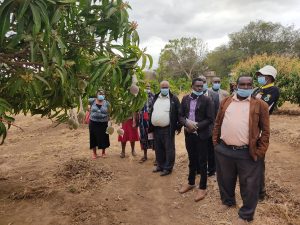COVID-19 has led to empty spaces and abandoned offices worldwide. This has been no different in Kenya, where several measures were put in place by the government to prevent the spread of the virus. For several months, a nationwide dust-to-dawn curfew was in force, restricting intercounty travel and prohibiting in-person meetings. Only companies providing essential services were allowed to operate as normal. Miyonga, with whom the WE4F East Africa Hub established one of its first partnerships, is considered a provider of an essential service, as it ensures that famers contribute to food security and the stable continuity of farmers’ income. This also means that Miyonga was a able to organize small group trainings from August 2021.

Farmer training in Taita Taveta. Photo: Ian Wasike
Last year, as part of their partnership, the East Africa RIH and Miyonga on Good Agricultural Practices (GAP) and Conservation Agriculture. The training of farmer groups that Miyonga sources its produce from, is the starting point for ensuring good quality products and reducing postharvest losses.

Learning from the champion farmer: participants on a farm visit. Photo: Ian Wasike
By carefully following COVID-19 protocols, the trainings could be organized in four different counties of Kenya: Taita Taveta, Makueni, Tana River, and Kilifi. The trainings targeted Miyonga staff and ‘champion farmers’ (high producing farmers practicing GAP) who are now replicating the trainings for other farmers. The trainings, which lasted three days, focused on banana, pineapple, and mango production and covered a broad range of topics including, site preparation, soil fertility maintenance, integrated pest management, organic certification processes, and the safe use of agrochemicals. After first going through theoretical training, the participants enjoyed seeing the application of GAP during a visit to one of the champion farmers’ farms. Here, they could discuss and take new ideas back to their own farms.
Opportunity in Fruit Processing
In addition to the farmer trainings, Miyonga staff that work on an aggregation and fruit processing site in Taita Taveta have been trained. The correct handling of fruit during processing is very important for ensuring high product quality and high health and safety standards for the workers. By locally processing fresh fruit into dried fruit and fruit powder products, Miyonga has created around 15 to 20 jobs in the community around the factory.
Most staff and casual labourers are new to the specifics of large-scale processing, so the food safety and compliance training prepared them for their new tasks. A total of 542 farmers participated in training on GAP and Conservation Farming and 31 staff and casual labourers were trained on food safety and compliance.
More trainings are planned for 2022 and, as the Miyonga staff have already completed a 10-day practical training given by a food processing expert, they are now ready to face the upcoming season’s processing – turning fruit into delicious, dried snacks.

Production of dried snacks: Coconut are cut to pieces and dried in the container dryer. Once dry, the pieces are ready to get packed. @Peter Kahenya
About the author:
 Kilian Blumenthal, Junior Technical Advisor in the WE4F East Africa Hub based in Nairobi, Kenya
Kilian Blumenthal, Junior Technical Advisor in the WE4F East Africa Hub based in Nairobi, Kenya
Contact: kilian.blumenthal@giz.de
Kilian holds a B.Sc. in Environmental Engineering of the HAW Hamburg and a M.Sc. in Agricultural Sciences in the Tropics and Subtropics of the University of Hohenheim. His academic research focused on Solar Water Pumping Systems in Bolivia and the Potential Use of Solar Energy in the Maize Value Chain in Benin. He has done numerous trainings on the SPIS Toolbox and gained experience during longer stays in South America and Sub Saharan Africa.


